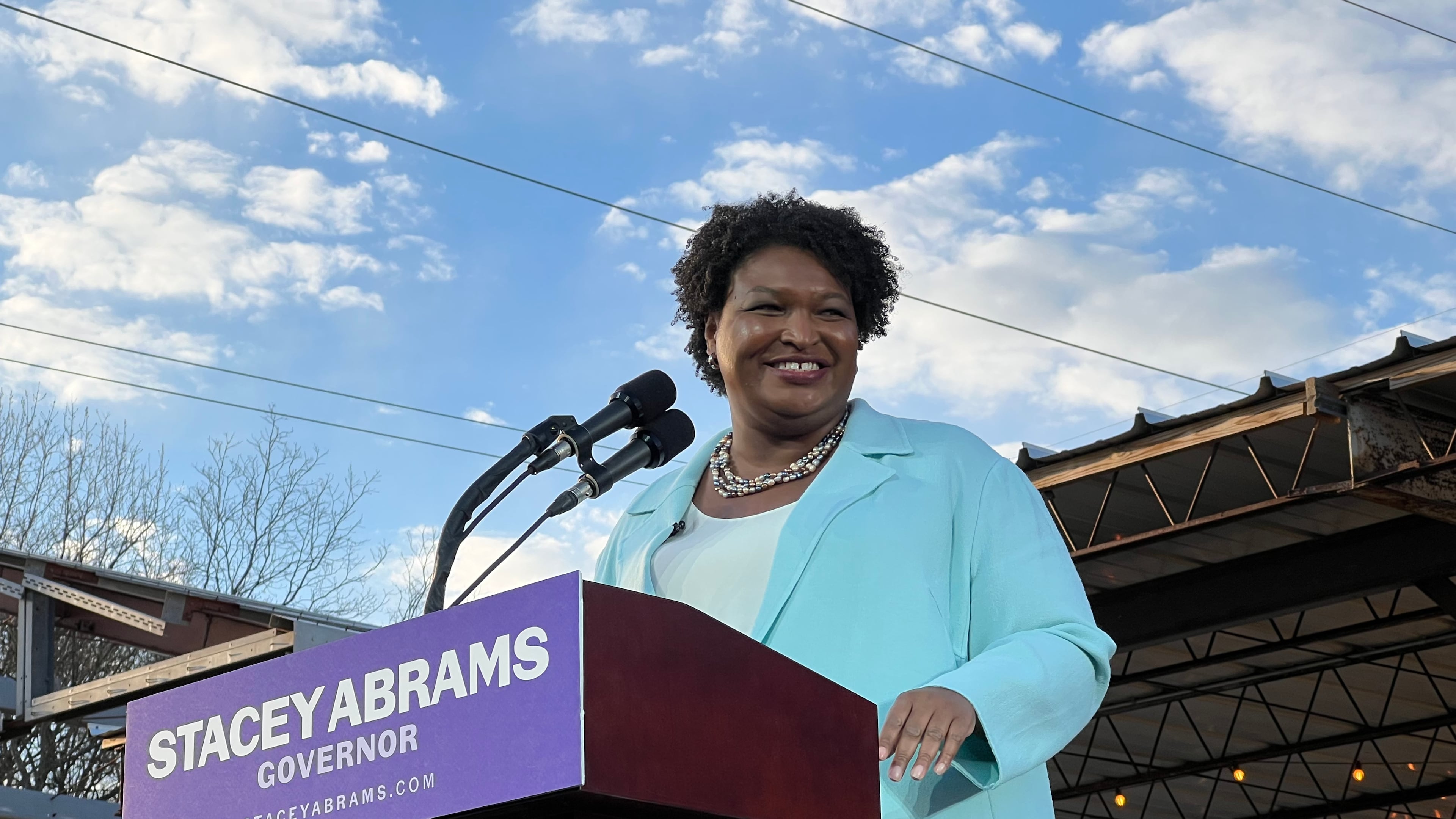Stacey Abrams makes a personal case for Medicaid expansion

Stacey Abrams kicked off her first day on the campaign trail in front of a shuttered hospital in rural Cuthbert with a vow to expand Medicaid. She ended it atop a stage in west Atlanta where she sharpened her message before a cheering crowd of hundreds of supporters.
Much like her 2018 campaign for governor, the Democrat’s central argument hinged on expanding the federal program, which Gov. Brian Kemp and other Republicans contend would be too costly and inflexible in the long term.
And just like in 2018, she used unsparing language to describe her Republican opponent, casting Kemp as “too lazy or too inept” to effectively lead the state as it struggles with mounting economic challenges. His Republican challenger, David Perdue, went unmentioned.
This campaign, however, Abrams shared a deeply personal story to underpin her demand for expanding healthcare access, a story that she’s scarcely mentioned in public until the Monday start of her first statewide tour this election.
It began in rural Randolph County, where she highlighted the plight of Southwest Georgia Regional Medical Center, a tiny hospital in Cuthbert that shuttered in late 2020 amid crippling financial problems at a time when the community sorely needed it.
At one point during the early days of the pandemic, Randolph County had the highest infection rate among Georgia’s 159 counties, with dozens of deaths attributed to the pandemic. Even an infusion of federal relief dollars couldn’t keep stave off the hospital’s financial ruin.
Abrams was introduced by a nurse who told supporters her aunt died because she couldn’t get an ambulance in time from the closest hospital that could dispatch one – a medical facility miles away in Alabama.
“That is a travesty. That is an atrocity. That is inexcusable,” Abrams said of the woman’s death. “Because if we had expanded Medicaid the first time, the second time or at any point during the times that Brian Kemp was putting together a plan to do less for fewer people, we could have saved her life.”
The first-term Republican governor has pushed an alternative to a full-scale expansion with a “waiver” program that would allow Georgia to impose a work and activity requirement for some lower-income Georgians to qualify for Medicaid insurance. He’s cast it as a conservative route to adding more Medicaid recipients to Georgia’s rolls.
That plan, approved in the waning days of the Trump administration, is now in legal limbo after President Joe Biden’s top Medicaid official rejected the work and activity requirement. Kemp has since sued the federal government to reverse the decision.
The governor’s proposal would wind up covering about 50,000 of Georgia’s poor adults. A full Medicaid expansion could cover at least 400,000 additional Georgians in need of health insurance, according to estimates. Abrams cited projections that showed it could also create tens of thousands of jobs.
“Medicaid expansion isn’t just a tag line,” she told supporters at her rally. “It’s the biggest economic development project in Georgia history.”
Then she shared a story she’s rarely mentioned. Abrams’ parents and her 15-year-old niece moved into her place during the pandemic. Her father, who has battled prostate cancer for more than 15 years ago, woke up ill about two weeks after they arrived.
Her panicked mother asked Abrams to press on his skin. It turned out he was on the verge of sepsis.
“But you see, I was able to pick up the phone and call, I was able to get him to a world-class hospital. He was able to get the care he needed. And when he ended up getting back in the hospital for eight days, he had the care he needed,” she said.
“It makes no sense in the state of Georgia if he’d been a few miles away, or a few counties away, my father would not be with us here today. That is a solvable problem and by God’s love for Georgia, I’m going to fix it.”
Abrams’ allies also believe expanding the program is simply good politics. An Atlanta Journal-Constitution poll in 2019 showed nearly three-quarters of Georgians said the state should expand eligibility for Medicaid.
Still, the idea remains deeply unpopular with a significant number of GOP primary voters, a factor Kemp must weigh as he faces a Donald Trump-backed challenge from Perdue.
“Like everything else Stacey has done over the last decade, for her the governors race in 2022 is about attaining more money and power,” said Kemp spokesman Cody Hall. “Brian Kemp beat her once and saved our state from her radical agenda - and he will do it again this November.”
Throughout her speech, Abrams highlighted other policy divides. She criticized the state for not fostering more small businesses. She accused Kemp and his allies for claiming credit for federal relief funds that Republicans opposed in Congress.
She talked of her background of launching nonprofits and other startups, saying “I did the work and now I want the job.” And she blasted Kemp’s decision to allow public school systems to determine their own coronavirus polices.
“We need a governor who doesn’t leave it to every single school system to figure out what they want because he’s too lazy or too inept to decide what should be done,” said Abrams.
But her address returned to her vow to expand Medicaid if she’s elected governor – even if it meant overcoming opposition in a Legislature that’s all but certain to remain under GOP control.
“Four years ago we were talking about the fact that Georgia was one of a number of states refusing to expand Medicaid,” she said. “What didn’t change is that we have a broken public healthcare system. And an incompetent governor refusing to fix it.”

